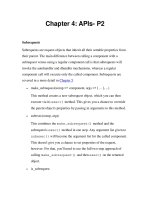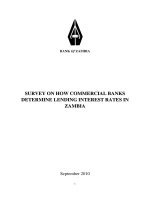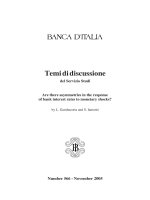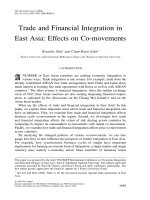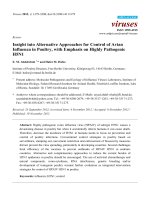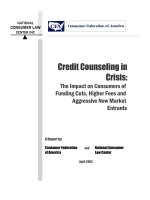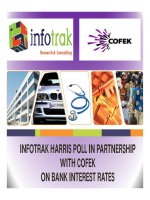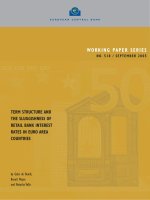INFOTRAK HARRIS POLL IN PARTNERSHIP WITH COFEK ON BANK INTEREST RATES docx
Bạn đang xem bản rút gọn của tài liệu. Xem và tải ngay bản đầy đủ của tài liệu tại đây (10.71 MB, 25 trang )
INFOTRAK HARRIS POLL IN PARTNERSHIP
WITH COFEK
ON BANK INTEREST RATES
Background on Bank
Lending Rates
Background
• Despite clear signals from the Central Bank of Kenya on the direction interest
rates ought to take in the market, commercial banks have been slow to respond.
Weeks after the monetary policy committee cut its base lending rate from 18 to
16.5 % only few banks have announced a reduction in interest rates. This could
be a concern for many borrowers who have had to struggle with a high interest
environment
• Furthermore, the Interest Rate Spread in Kenya’s commercial banks may remain
wide, unless banks manage to increase their customer deposits.
– Interest rate spread can simply be defined as the interest charged by banks on loans
to customers, minus the interest that banks pay on savings deposits.
• Analysts have alluded to the fact that despite many Kenyans urging banks to
increase the interest customers gain on deposits, current deposit levels are still
too low to fund the deposit interest.
Kenya Interest Rates
• The benchmark interest rate in Kenya was last reported at 16.5%
• Historically, from 1991 until 2012, Kenya Interest Rate averaged
15% reaching an all time high of 84.67% in July of 1993 and a
record low of 0.83% in September of 2003.
• In Kenya, interest rates decisions are taken by The Monetary Policy
Committee (MPC) of the Central Bank of Kenya.
• The official interest rate since August 2005 is the Central Bank Rate
(CBR), which replaced the 91-day Treasury Bill (TB) rate.
Bank interest Rates
Overview on BankTrak Survey
Conducted amongst banking
customers in April
Some of us think today’s Customer is……
PATIENT?
UNDERSTANDING?
FORGIVING?
IGNORANT?
CREDULOUS ?
UNDERSTANDING?
I am Today’s Customer
If you satisfy my wants with personal attention and a friendly touch, I will become a walking advertisement for your
products. If you ignore my wants or show carelessness, inattention or poor manners, I shall simply cease to exist as far as
you are concerned.
I am more
discerning
Much more so than I was a few
years ago. My needs are more
complex. I have grown accustomed
to better quality, better service and
better value. My customers are much
more demanding of me.
I am an egotist –
I am sensitive. I am proud. My
ego needs the nourishment of
friendly and professional
contact from you. It is
important to me that you
appreciate my business.
I am a perfectionist –
I want the best I can get for the
money I spend. If I am
dissatisfied, I will criticize your
products and services to anyone
who will listen. Take heed: The
source of my discontent lies in
something you or the products
you sell failed to do. Find that
source and eliminate it, or you
will loose my business and that
of my friends as well.
I am busy –
I am called upon to know more, do more, and accomplish more in less time than even two years
ago. I am, therefore, jealous of my time and if you cost me time, I will find someone who will
satisfy my wants and needs with dispatch. Do not keep me waiting. To be forced to return products
because of shoddy workmanship is the greatest waste of all.
Reasons why Banking customers stop
using banks they used in the past
6%
9%
9%
14%
39%
39%
0% 20% 40% 60% 80% 100%
Require minimum balance
Poor customer care services
Poor branch network
Slow Processing of loans
High Banking rates, charges and hidden
charges
Long queues, slow in services
delivery, congestion
What customers like about their
current banks
2%
3%
3%
5%
7%
7%
8%
9%
9%
20%
20%
37%
0% 20% 40% 60% 80% 100%
Agent Banking
Mobile banking services
Use up to date technology
Good reputation
Stable bank hence security
Offers variety of products and services
Ease of accessibility to credit facilities
Wide branch network
Conveniently located
Good customer care
Affordable operational cost
Fast and efficient banking services
What Banks can do to make Customers
Happy ?
• In your opinion, what can banks do to make customers happy.
1%
1%
3%
3%
4%
5%
9%
12%
15%
26%
45%
0% 50% 100%
Affordable mortgage
24_7 servicers
Offer mobile banking
Lower minimum balance charges
Wide ATM network services
Increase tellers
Fast and efficient banking services
Good quality services
Ease of accessibility, wide banking network
Good customer care
Affordable interest rate
INFOTRAK HARRIS POLL IN PARTNERSHIP
WITH COFEK
ON BANK INTEREST RATES
The Methodology
• The poll was sponsored by Consumer Federation of Kenya (COFEK) and conducted by InfotrakResearch &
Consulting between 19
th
and 20
th
July, 2012
• A sample of 1000 respondents was interviewed to represent 6,916,000 middle class population residing in
urban areas. This translated into a minimum margin of error of -/+ 3.3 at 95% degree of confidence. The
survey was conducted in nine major towns in Kenya
• Using the 2009 Kenya Population & Housing Census as the sample frame, the sample was designed using
Population Proportionate to Size (PPS) and mainly entailed;
– Use of stratification, random and systematic sampling in drawing regions to be covered
– Ensuring further distribution by area, age , socio-economic class and gender
– Ensuring that every person in the sampled areas had a known chance of being selected
• Fieldwork was using face to face interviews
– 25 of the interviews were back checked for quality control purposes and data entered twice for validation
purposes
– Respondent selection was through random and systematic sampling
• Data processing & analysis was carried using CS-Pro and SPSS 17.0
• The questions asked are highlighted after each graphic presentation
Survey Phases
Quantitative Approach employed
Face to Face (F2F) interviews
amongst various potential middle class
consumers to determine incidences in
quantifiable terms
• The Quantitative
approach Target the
following groups
• Middle class
consumers (C1 and
C2)
The Quantitative
Approach
• Self employed (Formal)
• Self employed (Informal)
• Employed (Permanent)
• Employed (Casual)
Middle class
consumers
The Sample Defined
Method Scope Sample
1. Quantitative
Face To Face Survey
Face to face interviews
• Middle class consumers
•Age: 18+
•Gender: Male/Female
•SEC: C1 and C2
1000 Interviews
Town
Sample Ratio
Nairobi
310 31%
Nyeri
70 7%
Kisumu
120 12%
Mombasa
130 13%
Nakuru
70 7%
Eldoret
70 7%
Kakamega
110 11%
Embu
50 5%
Machakos
70 7%
Total
1000 100%
Key areas of exploration
• What remedial actions need to be taken to
protect consumers in the banking industry?
– (Sufficient Reduction of loan lending rates)
• Is the legal and institutional framework governing
the banking sector sufficient to cushion
consumers of banking services from capitalistic
and profit oriented nature of commercial banks?
Banking sector
Only 35 % of respondents are satisfied
with CBK role in regulating commercial
banks
58% don’t feel that Commercial
Banks take their increasing
consideration when increasing their
lending rates
94% consider that the standard Lending rates
that should be adopted by commercial banks
should be below 10%
(6-10%) 56%
(1-5%) 38%
(Over 10%) 6%
Suggested standard lending rates by respondents
What should be the standard lending rates to be adhered to by all
commercial banks in Kenya?
• Kenyans feel the
current lending
rates are too high
and should not
exceed the 10%
threshold
ABOUT INFOTRAK
Infotrak Research and Consulting (hereinafter referred to as Infotrak) is a highly reputed research company with
exceptional qualifications and extensive experience in high quality research. Infotrak’s technical strengths lie in its ability
to efficiently design and field social science surveys and impact evaluations of the highest quality and to manage
survey, administrative, and program data for research and evaluation purposes.
The company was founded and incorporated under the Laws of Kenya in 2004 following the vision of the founder to
provide the Pan African Market with suitable information solutions required to sustain the needs of the ever-growing
economies. Headquartered in Nairobi Kenya, Infotrak also has affiliate offices in Uganda, Tanzania, Nigeria and field
contacts in more than 12 other countries in Sub-Saharan Africa.
The Research and Consultancy firm, which is currently one of the fastest growing in the region, attributes its rapid growth
to not only innovation, high level of professionalism and dynamism, but also on the excellent caliber of personnel who
have been described by many as “Business Minds who specialize in research”. In 2007, Infotrak became a global network
affiliate of Harris Interactive USA, the 12th largest and fastest-growing market and social research firm in the world.
Infotrak has a long history in conducting research and has carried out similar projects for various clients. We have set a
worldwide standard in the efficient conduct of scientifically rigorous data collection efforts, which encompass the
development of survey instruments, the design of efficiently executable and scientifically valid samples, survey
administration and data acquisition, data processing, and analysis.
Today, Infotrak is one of the most authoritative pollsters in Kenya, providing political opinion polling under the Infotrak
Harris Poll flagship brand. In the recent constitutional referendum in Kenya, Infotrak was the only research firm which
accurately predicted the outcome of the referendum.
The company has retained both permanent and temporary employees to discharge its activities. The team is comprised of
highly motivated, talented and experienced professionals with academic competence in diverse fields. The team has
extensive and proven experience in both qualitative and quantitative research methodologies.
About Consumer Federation of Kenya
(COFEK)
• The Consumer Federation of Kenya (COFEK) is an independent, self-funded, multi-sectoral
and non-profit society, registered on 26th March 2010 as a membership society under Cap.
108 Laws of Kenya.
• COFEK members are ordinary consumers and professionals from various walks of life and
areas spread across the country who see the need to own and support COFEK
vision, mission and values.
• COFEK emphasizes the need for a conducive environment to allow for competitive trade
and business.
• The society strongly believes that what is good for the consumer is good for business.
• It is the responsibility of COFEK to fight against monopolies and exploitative prices as well
as counterfeits and unfair business practices
